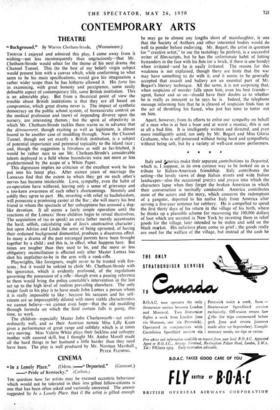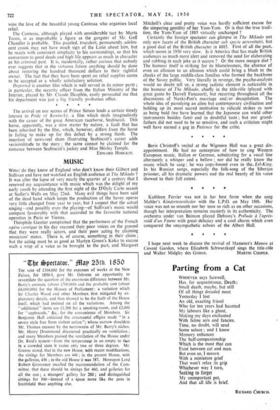CINEMA
“ In a Lonely Place." (Odeon.)—....fie Deported." (Gaumont.) --A, Pride of Kentucky." (Carlton.) THE question how far artists may be excused eccentric behaviour which would not be tolerated in their less -gifted fellow-citizens is one that has been often asked and variously answered. The answer suggested by In a Lonely Place. that if the artist is gifted enough
he may go to almost any lengths short of manslaughter, is one that the Society of Authors and other interested bodies would do well to ponder before endorsing. Mr. Bogart, the artist in question (or " creative artist," to use the tautology he prefers), is a successful writer of film-scripts, but he has the unfortunate habit of hitting bystanders in the face with his fists (or a brick, if there is one handy) when irritated—and he is easily irritated. The reason for this weakness is not explained, though there are hints that the war may have something to do with it, and it seems to be generally accepted that assault and battery are an essential part of Mr. Bogart's literary technique. All the same, it is not surprising that, when suspicion of murder falls upon him, even his best friends— agent, fiancé and so on—should have their doubts as to whether he is really as innocent as he says he is. Indeed, the telephone message informing him that he is cleared of suspicion finds him in the act of throttling his fiance, who just has time to totter out on him.
Apart, however, from its efforts to enlist our sympathy on behalf of a man who is at best a boor and at worst a maniac, this is not at all a bad film. It is intelligently written and directed, and even more intelligently acted, not only by Mr. Bogart and Miss Gloria Grahame, who is self-possessed without being hard and sympathetic without being soft, but by a variety of well-cast minor performers.
Italy and ginerica make their separate contributions to Deported, which is, I suppose, in its own curious way to be looked on as a tribute to Italian-American friendship. Italy contributes the setting—the lovely views of deep Italian streets and wide Italian landscapes—also the occasional grazics and pregos into which the characters lapse when they forget the broken American in which their conversation is normally conducted. America contributes most of the actors and the story, which concerns the redemption of a gangster, deported to his native Italy from America after serving a five-year sentence for robbery. He is compelled to spend the first thirty days of his return in the village of his birth, where he thinks up a plausible scheme for recovering the 100,000 dollars of loot which are secreted in New York by investing them in relief goods for the village, later intended to be stolen and sold on the black market. His nefarious plans come to grief ; the goods really are used for the welfare of the village, but instead of the cash he
wins the love of the beautiful young Contessa who organises local relief.
The Contessa, although played with considerable tact by Marta Toren, is as improbable a figure as the gangster of Mr. Geff Chandler is probable. This puzzled, truculent, permanently adoles- cent crook may not have much sign of the Latin about him, but he reacts with consistent simplicity to his surroundings, so that his conversion to good deeds and high life appears as much in character as his criminal past. It is, incidentally, rather curious that nobody ever suggests that in the virtuous future anything should be done about restoring the hundred thousand dollars to their rightful owner. The fact that they have been spent on relief supplies seems to be accepted as a wholly satisfactory solution.
Deported is another film which is well served in its minor partg ; in particular, the security officer from the Italian Ministry of the Interior, played by Mr. Claude Dauphin, easily persuaded me that his department was just a big friendly probation office.
The arrival on our scenes of Prince Simon lends a certain timely interest to Pride of Kentucky, a film which deals imaginatively with the career of the great American racehorse, Seabiscuit. This horse, apparently, was a slow starter by nature, a fault that has been inherited by the film, which, however, differs from the horse in failing to make up for this defect by a strong finish. The insertion of news-reel shots illustrating Seabiscuit's career adds verisimilitude to the story ; the same cannot be claimed for the romance between Seabiscuit's jockey and Miss Shirley Temple.
EDWARD HODGKIN.







































 Previous page
Previous page